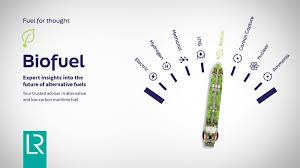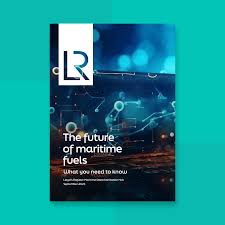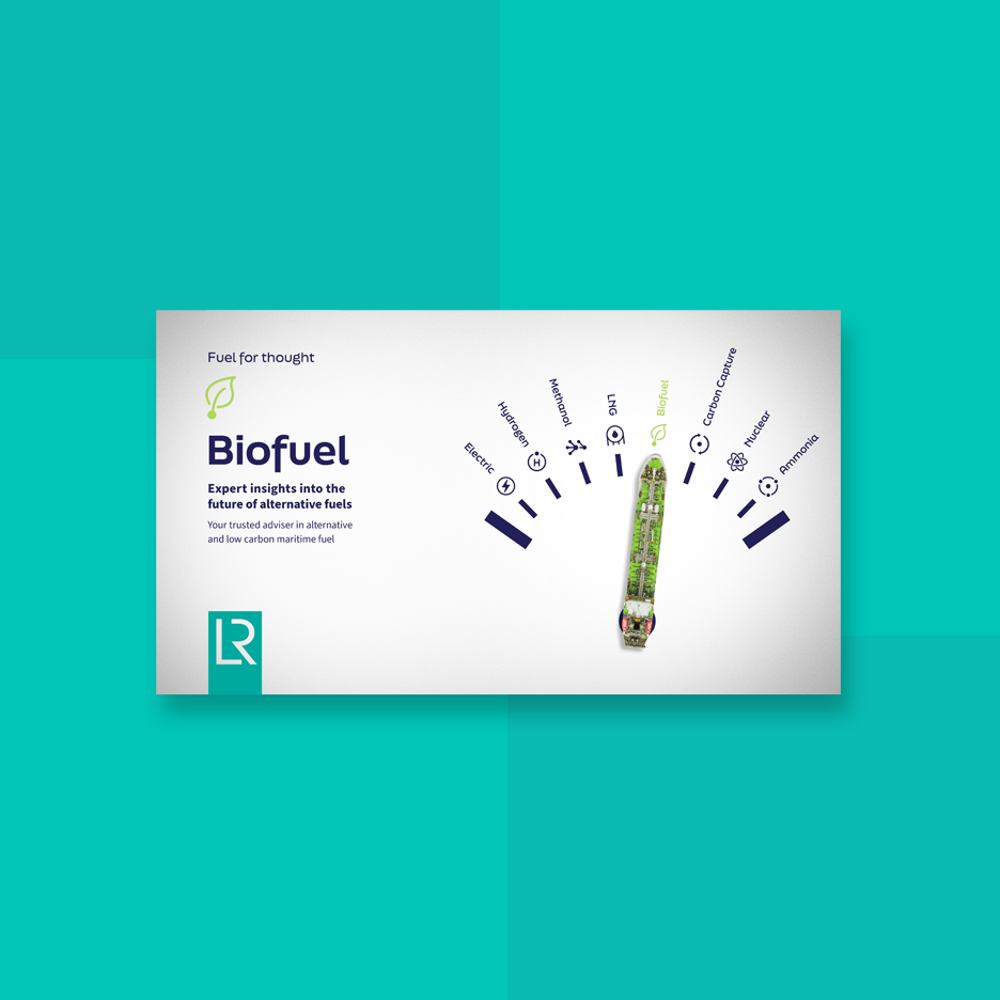Lloyd’s Register, in its new report titled “Fuel for Thought: Biofuel,” highlights the potential of biofuels as a low-emission alternative fuel that requires minimal capital investment while extending the operational lifespan of the majority of the world’s ships. The report suggests that biofuels could play a crucial role in the decarbonization of the shipping industry.
Currently, discussions around new marine fuels primarily focus on “changing the fuel itself,” such as ammonia, methanol, hydrogen, and LNG. However, LR’s latest report outlines the potential of biofuels not only to reduce greenhouse gas emissions but also to utilize existing infrastructure, emphasizing the promise of biofuels in the maritime sector.
Text by Hiro Yamamoto
Photo courtesy of Lloyd’s Register

■What Are Biofuels?
Biofuels are a broad category of fuels derived from biological materials. They can be directly combusted or processed into forms like alcohol fuels, synthetic gases, or solid fuels such as coke and pellets, making them suitable for various applications, including biomass power generation, aviation, automotive, and marine uses.
According to the 2021 OECD-FAO Agricultural Outlook, over 60% of global bioethanol is produced from corn, and 25% from sugarcane, meaning that these two raw materials account for more than 80% of global production. For biodiesel, about 75% comes from vegetable oils, while 20% is derived from waste cooking oils.
However, one of the significant barriers to the widespread adoption of biofuels is their high production costs. For all fuels, including petroleum-based ones, raw material costs constitute a substantial portion of production costs. In the case of biofuels, these raw material costs tend to be higher than those for crude oil.
Lloyd’s Register’s latest report defines drop-in fuels, which can directly replace fossil fuels, as a cost-effective way to comply with environmental regulations. If the barriers to their introduction are overcome, they could potentially extend the lifespan of older ships.
Biofuels have the potential to play an essential role in decarbonizing shipping due to their low emissions and the minimal capital investment required to extend the operational lifespan of much of the world’s fleet. However, the new report by LR points out that challenges, such as the availability of raw materials and competition for demand from other transport sectors, must be resolved to enable widespread adoption.
Biofuels have the potential to play an essential role in decarbonizing shipping due to their low emissions and the minimal capital investment required to extend the operational lifespan of much of the world’s fleet. However, the new report by LR points out that challenges, such as the availability of raw materials and competition for demand from other transport sectors, must be resolved to enable widespread adoption.

■Drop-In Fuels
The report identifies biofuels as a means for ships, where retrofitting to adopt other future fuels may not be economically feasible, to comply with environmental regulations. As a “drop-in” fuel, biofuels require minimal changes to machinery and operations and can reduce greenhouse gas emissions by up to 84% compared to conventional fuels.
Due to the similarities between biofuels and their fossil fuel counterparts, as well as their ability to blend with conventional fuels, the adoption of biofuels is a relatively straightforward process for shipowners compared to other alternative fuels. Biofuels are generally compatible with existing onboard equipment and fuel tanks, utilize the same bunkering infrastructure as fossil fuels, and are similar to traditional bunkers, thereby minimizing the training requirements for crew members compared to other future fuels.
The most established products suitable for maritime use are Fatty Acid Methyl Esters (FAME) and Hydrotreated Vegetable Oil (HVO), with ongoing development of new fuels. Ship operators need to pay attention to the specific characteristics of each type of biofuel.
There are various types of biofuels, each produced by different processes and using different raw materials. These variables can affect the greenhouse gas intensity of the fuel and may introduce additional considerations for machinery operations. LR’s new report, “Fuel for Thought: Biofuel,” provides detailed information on industry standards for FAME and HVO, general considerations for engines and machinery, and the processes for testing new and unproven biofuels in marine engines.

■The Battle for Biofuels
According to the report, the primary challenges to widespread deployment are the availability of raw materials, competition from other transport sectors—including aviation—and the investment required to increase biofuel production capacity to meet rising demand from the transport sector. As demand drives up raw material prices, it is expected that the cost of biodiesel blends will also rise in proportion to the blending level.
Tim Wilson, Principal Specialist for Fuels, Lubricants, and Emissions at Lloyd’s Register, stated:
“Biofuels are unique among future fuels because the majority of the world’s ships are already equipped with engines that can use them. As an alternative to fossil fuels, biofuels offer an affordable and immediately available way to reduce carbon emissions in the short term without requiring significant capital investments. Extensive trials across different shipping segments and biofuel types reflect the strong interest that shipowners have shown in using biofuels onboard.”
LR’s “Fuel for Thought: Biofuel” report consolidates the most relevant information on the use of biofuels in shipping, serving as a valuable reference for shipowners considering alternative fuel options for their fleets and as a resource for maritime professionals seeking a deeper understanding of the transition to zero-carbon.
This report brings together expertise from LR and other maritime knowledge leaders on the characteristics and operational considerations of biofuels, regulatory factors influencing their adoption, techno-economic considerations, fuel quality and availability, and the testing of biofuels in ships.
Based on the success of the previous “Fuel for Thought” reports, this new report demonstrates LR’s commitment to creating a one-stop repository of relevant information on all alternative fuels for the maritime industry. It also incorporates data from LR’s recently updated “Zero-Carbon Fuel Monitor,” which provides an insight-based assessment of the readiness of biofuels and other zero-carbon fuels for maritime applications.

〆Lloyd’s Register(LR)は船舶燃料としてのバイオ燃料の可能性について新たなレポートで解説している。
LRは彼らのニューレポート「Fuel for Thought: Biofuel」で、 バイオ燃料は、低排出の代替燃料として、設備投資が少なく、世界の船舶の大部分の運航寿命を延ばす可能性を秘めており、海運の脱炭素化に重要な役割を果たす可能性があると指摘している。海運業界の新燃料ではアンモニア、メタノール、水素、LNGなど「燃料そのものを変更する」という議論が主流である。しかし、LRの今回のレポートではバイオ燃料を活用することで、既存設備を活用できるほか、温室効果ガスの削減も可能として、バイオ燃料の有望性について説明する。
(Text by Hiro Yamamoto)
Photo courtesy= Lloyd’s Register
■バイオ燃料とは
バイオ燃料とは生物体を利用した燃料全般のこと。 バイオ燃料は直接燃焼させるほか、用途に応じてアルコール燃料や合成ガス、コークス状やペレット状の固形燃料のように加工され、バイオマス発電や航空機、自動車、船舶など幅広い機械の燃料として使われる。
2021年のOECD-FAO Agricultural Outlookによれば、世界全体でバイオエタノールは約60%がトウモロコシ、25%がサトウキビと、80%以上を2つの原料で占める。バイオディーゼルについては約75%が植物油、20%が廃食油だ。
一方、バイオ燃料の普及が進展しない大きな原因が、製造コストが高いことである。 石油系の燃料を含めて、原料コストが製造コストに占める割合は非常に高く、バイオ燃料の原料コストが原油に比較して高くなる傾向にある。
LRの最新レポートは、化石燃料の代替品としてのドロップイン燃料は、環境規制を遵守するためのコスト効果の高い方法であり、導入の障壁が克服されれば、古い船舶の寿命を延ばすことができるかもしれないと定義する。
バイオ燃料は、低排出代替燃料であり、低い設備投資で世界の船舶艦隊の大部分の運航寿命を延ばす可能性があるため、船舶の脱炭素化において重要な役割を果たす可能性がある。バイオ燃料の課題として、原料供給量と他の輸送部門からの需要競争という課題が広範な導入に向けて解決される必要があると、LRは新レポートで指摘している。
■ドロップイン燃料
このレポートでは、他の将来燃料を採用するための改造が経済的に実行不可能な船舶にとって、環境規制に準拠するための一つの方法としてバイオ燃料を指摘する。「ドロップイン」燃料として、バイオ燃料は機械や運用に最小限の変更を必要とし、従来の燃料と比較して最大84%の温室効果ガス排出削減することができると説明する。
バイオ燃料とその化石燃料の同等品の類似性、および従来の燃料とブレンドできる能力により、バイオ燃料の採用は他の代替燃料と比較して船主にとって比較的簡単なプロセスとなる。バイオ燃料は一般的に既存の船上機器および燃料タンクと互換性があり、化石燃料と同じバンカリングインフラを使用し、従来のバンカーと類似しているため、乗組員の訓練要件は他の将来燃料と比較して最小限で済む。
船舶に適した最も確立された製品は、脂肪酸メチルエステル(FAME)と水素化植物油(HVO)であり、新しい燃料の開発も続いている。船舶運航者は、特定のバイオ燃料の個別の特性に注意を払う必要がある。
バイオ燃料にはさまざまな種類があり、それぞれ異なるプロセスで製造され、さまざまな原料が使用されている。これらの変数は燃料の温室効果ガス強度に影響を与え、機械の運用に関する考慮事項を増やす可能性がある。LRの新レポート「考えるべき燃料:バイオ燃料」は、FAMEとHVOの業界基準、エンジンや機械に関する一般的な考慮事項、および海洋エンジンでの新規および未検証のバイオ燃料の試験を実施するためのプロセスを詳述している。
■バイオ燃料の争奪戦
レポートによれば、広範な展開の主な課題は、原料供給量と航空を含む他の輸送部門からの需要競争、および輸送部門からの需要の増加に対応するために必要なバイオ燃料生産能力への投資にある。需要により原料価格が上昇するため、バイオディーゼル混合物の価格は混合レベルとともに上昇することが予想されているのだ。
Lloyd’s Registerの燃料潤滑油および排出専門家であるティム・ウィルソン(Tim Wilson, Principal Specialist Fuels Lubes and Emissions)は次のように述べている。
「バイオ燃料は、世界の大部分の船舶が使用できるエンジンを装備しているという点で、将来の燃料の中で特異な存在です。化石燃料の代替品として、バイオ燃料は大規模な設備投資を伴わずに短期的に炭素排出を削減するための手頃で利用可能な方法である。船舶セグメントおよびバイオ燃料タイプにわたる広範な試験は、船主が船上での使用に強い関心を示していることを反映している」
LRの「考えるべき燃料:バイオ燃料」は、船舶のバイオ燃料使用に関する最も関連性の高い情報を一つにまとめ、船主がその艦隊の代替燃料オプションを検討する際の便利なリファレンスとして、また、ゼロカーボン転換について深く理解を求める海事専門家向けの参考資料として役立つ。
このレポートは、バイオ燃料の特性と運用上の考慮事項、バイオ燃料採用のための規制要因、技術経済的考慮事項、燃料品質と利用可能性、および船舶におけるバイオ燃料試験に関するLRおよびその他の海事知識リーダーの専門知識を結集している。
このレポートは、以前の「考えるべき燃料」レポートの成功に基づいて、海事業界向けのすべての代替燃料に関する関連情報をワンストップで提供するリポジトリをLRが作成していることを示す。
このレポートには、LRの最近更新された「ゼロカーボン燃料モニター」からの情報も含まれており、これは海事用途向けのバイオ燃料およびその他のゼロカーボン燃料の準備状況に関する洞察に基づく評価となっている。
